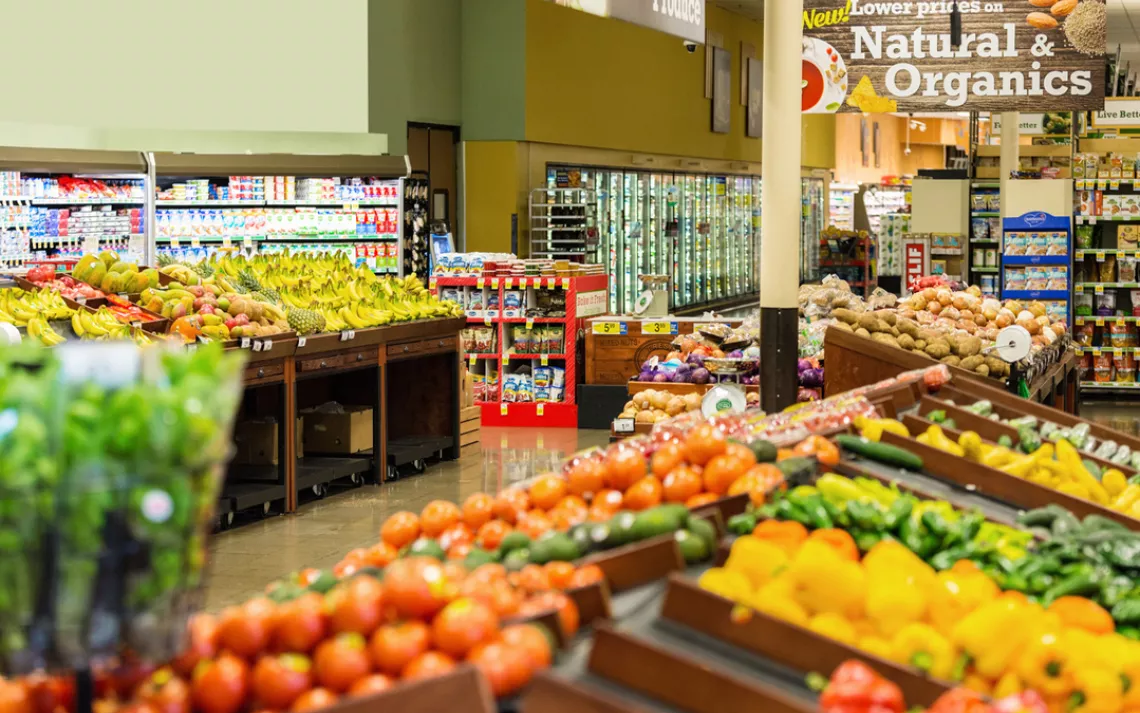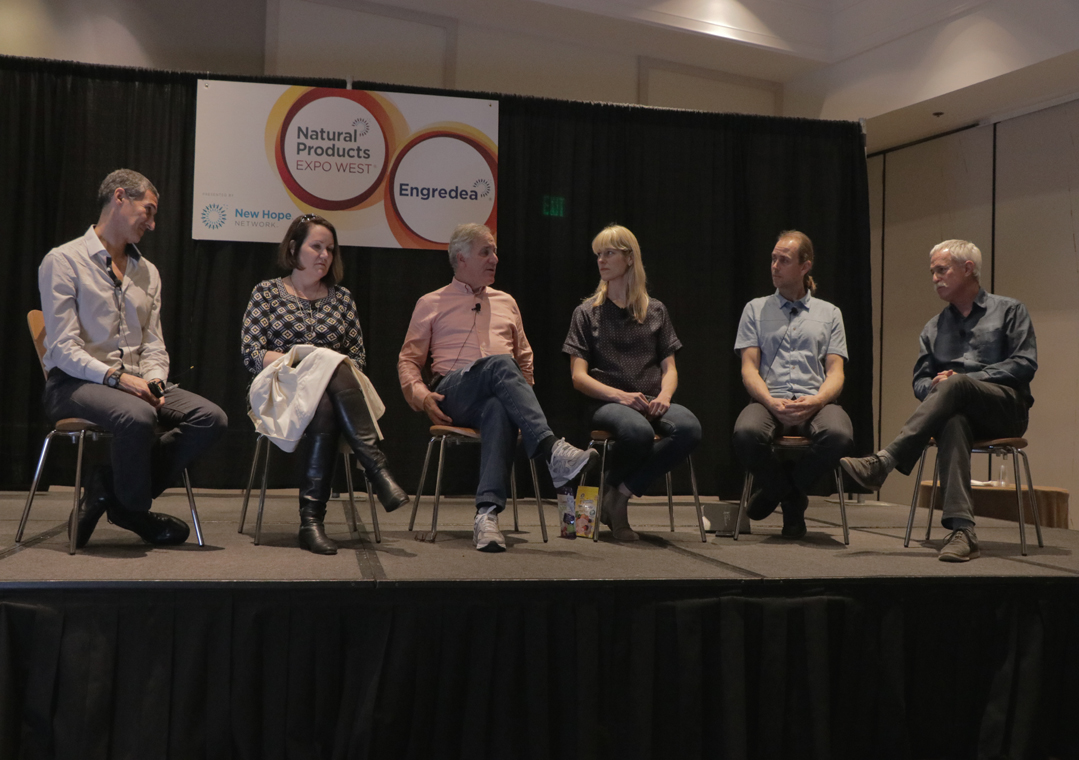Appetite for Climate Action
Natural-food brands band together to reduce emissions

Photo by asiseeit/iStock
The caricatured health nut, guilelessly spouting the virtues of spirulina and chia and the horrors of consuming chemicals, is no longer on the fringe. Case in point? The natural-products industry is expected to generate as much as $250 billion in annual sales by 2019—up from $153 billion in 2013.
This is good news for environmentalists—even those of you who don’t worship at the altar of kale. That’s because natural-product brands are historically at the vanguard of corporate social responsibility. In the past, companies like Annie’s, Barbara’s, and Organic Valley have brought animal welfare, organic agriculture, and fair trade into the mainstream. This year, the industry known for putting endangered birds on cereal boxes and using taglines celebrating no “icky additives” or “pesky preservatives” is getting proactive about arguably the most urgent environmental threat today: climate change.
Rather than await governmental action to reduce greenhouse gas emissions, executives from several natural-product companies—including Stonyfield Farm, Dr. Bronner’s, New Hope, Annie’s, Happy Family, Organic Valley, National Co+Op Grocers, and Lotus Foods—recently banded together to devise a three-year initiative, dubbed Climate Collaborative, to catalyze climate action within the industry. The collaborative is focused around nine key areas: food production, energy efficiency, food waste, forest conservation, packaging, government policy, renewable energy, transportation, and short-lived climate pollutants (such as methane).
The collaborative simply asks participating companies to identify those areas where they could make a meaningful commitment to climate action, and to use the Climate Collaborative website to publicly commit to demonstrable actions—say, purchasing 100 percent renewable power or avoiding deforestation in their supply chain. Any natural-product manufacturer, retailer, distributor, or consultant seeking to understand and solve issues related to climate change are welcome to make commitments. So far, more than 60 have done so.
The idea is not just to encourage organizations to pool their expertise and educational resources to accelerate progress toward a shared goal, but also to harness the power of peer-to-peer accountability. To that end, Climate Collaborative requires participating companies to report back on their emissions-reduction progress on an annual basis.
“We’re not asking for a huge self-audit. We just want to make sure companies are moving forward,” says Climate Collaborative cofounder Nancy Hirshberg, a sustainability consultant who for more than two decades served as Stonyfield Farm’s VP of natural resources. “If it’s not, its logo gets kicked off the list on our site. You don’t have to succeed right away, but you have to show a good-faith effort.”
Crunchy companies aren’t the only ones banding together to foster climate action. Climate Collaborative was modeled after an existing coalition called We Mean Business, which aims to share information and resources to help large, Fortune 500–size companies commit to transitioning to a lower-carbon economy and mine the economic opportunities found in climate action.
Hirshberg says the natural-food industry has a special edge, thanks largely to agriculture’s (well, soil’s) carbon-sequestering capabilities. “We greatly affect the impact of climate change, and food production is also where a lot of the opportunity for climate change action lies,” she explains, noting that the Climate Collaborative model was designed to accommodate brands or companies of any size. “A lot of companies are excited about regenerative agriculture right now, but that might be a heavy lift at the moment. In the meantime, they can start with their packaging, their food waste, and their energy efficiency. We tried to remove all barriers to climate change action.”
By “we,” Hirshberg means Lara Dickinson, cofounder and director of One Step Closer to Organic Sustainable Community (OSC2), a Northern California–based community of sustainability-focused CEOs and business leaders; Jessica Rolph, COO and founding partner of Happy Family, an organic baby/toddler food brand; and Katherine DiMatteo of the Sustainable Food Trade Association, a nonprofit comprised of organic producers, processors, manufacturers, distributors, and vendors.
“It started [in 2015] with a conversation between Lara and Jessica about finding ways to work with our peers in the natural products industry,” Hirshberg says. “A few weeks later, we all met on a panel, and I told them I had left Stonyfield to focus on climate. We agreed to work together on a plan and brought in Katherine.” In March 2016, the four floated the idea by industry leaders who were attending a major natural-products convention.
The reception, Hirshberg says, was huge. “People are desperate for what they can do, but they often don’t know what steps to take,” she says. “We polled 75 natural-products companies, and all of them felt [climate change] was already here and affecting us, and 97 percent felt we could do more. So we designed the program around helping companies make it a priority and identify a clear path to meaningful action.”
The nascent initiative was galvanized by the election of Donald Trump. “On November 9, we got a gift of $100,000 from [CEO of the National Cooperative Grocers Association] Robynn Shrader, up from the forty grand they were originally going to give us,” Hirshberg says. “She said, ‘We’re reprioritizing climate change.'”
The whole endeavor raises the question of whether consumers, given the increasing threat of climate change and the current U.S. administration’s defiant lack of concern, will demand more action from the businesses they patronize. Gary Vegh, owner of ERA Environmental Management Solutions, says corporate social responsibility is increasingly imperative. “Frankly speaking, there’s an increase in awareness partly because companies are using it for PR as well as for profit,” he says. “The result? Consumers are driving manufacturers to be even more green, by expecting a green supply chain. Yes, they ultimately care about the end product, but how many car shoppers today are asking, ‘How many miles can I get per gallon?’ ‘What were waste emissions for its creation?’ They want the best value, which often encourages companies to improve their supply chain and reduce waste.”
A recent survey commissioned by Unilever revealed that 87 percent of Americans reported greater consumer loyalty toward those companies that support social or environmental issues. The conglomerate also reported that the natural brands among its massive portfolio (which include Ben & Jerry’s, Breyer’s, Lipton, and Hellmann’s) were growing 30 percent faster than the rest of its business.
Hirshberg attributes this boom to the natural-product industry’s longtime focus not only on product performance and affordability, but also on corporate social responsibility. “Whether you’re on the left or right, blue or red, the science is clearer every day. There’s more agreement on every aspect of climate change—namely, that we need to take action,” she says. “We’re at that tipping point with Americans’ awareness. And what sets Climate Collaborative apart is that it’s action-oriented, geared toward actual behavioral change.”
Stay tuned for Climate Collaborative’s initial findings, when participating brands unveil their best practices and innovative actions—and compete for climate action awards—at the March 2018 Natural Products Expo West convention.

Natural-products executives on a "climate panel" at Natural Products Expo West 2017. From left: Seth Goldman of Honest Tea/Beyond Meat, Robynn Shrader of National Co+Op Grocers, Gary Hirshberg of Stonyfield Farm, Jessica Rolph of Happy Family, Chris Mann of Guayaki, Joel Makower of Green Biz. | Photo by Sarah Engelhart
 The Magazine of The Sierra Club
The Magazine of The Sierra Club



